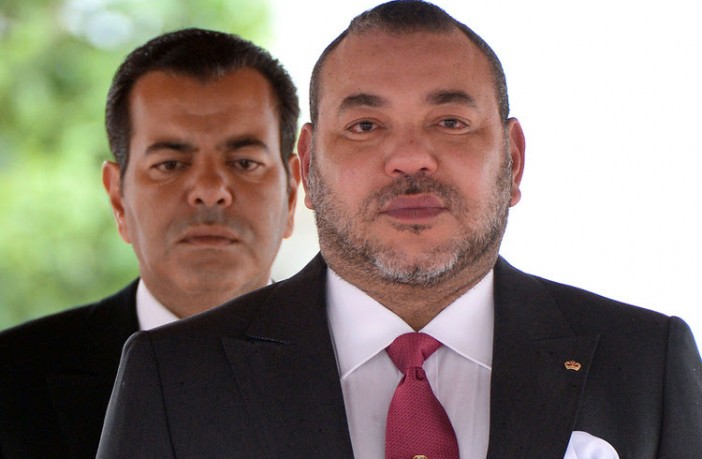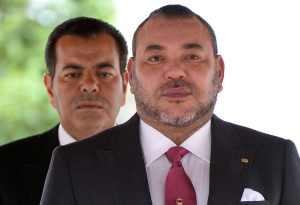Bloomberg Business
by Olivier Monnier Caroline Alexander
Since the end of May, Abidjan has had a special guest: King Mohammed VI of Morocco.
Though he spent just a week in Ivory Coast’s commercial capital as part of an African investment tour, his portrait still towers over its lagoon, facing the business district’s skyline and illuminated by two spotlights at night. Moroccan flags lined main boulevards and posters sponsored by local units of two of Morocco’s biggest banks welcomed him.
The monarch’s business pitch is part of his nation’s efforts to deepen trade with West Africa after the financial crisis exposed the dangers of relying too heavily on the North African country’s top export destinations, the European Union and the U.S.
Since the end of May, Abidjan has had a special guest: King Mohammed VI of Morocco.
Though he spent just a week in Ivory Coast’s commercial capital as part of an African investment tour, his portrait still towers over its lagoon, facing the business district’s skyline and illuminated by two spotlights at night. Moroccan flags lined main boulevards and posters sponsored by local units of two of Morocco’s biggest banks welcomed him.
The monarch’s business pitch is part of his nation’s efforts to deepen trade with West Africa after the financial crisis exposed the dangers of relying too heavily on the North African country’s top export destinations, the European Union and the U.S.
But it also offers the kingdom, which has so far avoided the turmoil that’s engulfed parts of the region, the opportunity to promote its moderate Islamic theology and politics in a region where extremism is on the rise.
“Moroccan companies have established a successful presence in these countries and there’s clear input from the monarchy to support this,” said Riccardo Fabiani, senior North Africa analyst at London-based Eurasia Group. “It’s nothing compared to trade with Europe, but it’s expanding quite fast.”
Lured by economic growth rates as high as 10 percent and a desire to position itself as an investment and trade bridge linking Africa and Europe, Morocco doubled exports to sub-Saharan Africa from 2008 to 2013. Its investment in Africa reached about 1.4 billion Moroccan dirhams ($145 million) last year, according to the Rabat-based foreign exchange regulator, about a third of total investment. A regional finance hub is being built in the coastal city of Casablanca.
Diversifying Investments
The knock-on effects of the EU debt crisis rattled Morocco and a need to diversify helped fuel its southern expansion. Opportunities arose after the 2011 ouster of Muammar Qaddafi, who had deployed Libya’s energy riches across the continent to back his ambition to be a pan-African leader, and Europe’s recession, which led French banks to reduce their operations in West Africa.
With trade worth more than 27 billion euros ($31 billion) in 2013, the EU is the kingdom’s biggest commercial partner, accounting for about 50 percent of its total. While Morocco’s exports to Europe are dominated by agricultural products and clothing, its charge into West Africa is led by its finance, construction and telecommunication companies.
‘Real Opportunity’
Attijariwafa Bank, Morocco’s biggest lender, has 312 branches in West Africa. It helps finance many of the kingdom’s regional projects, including the 100 billion CFA Francs ($171 million) cleaning of Abidjan’s lagoon, the largest of about four dozen accords signed during Mohammed VI’s visit.
Maroc Telecom bought Emirates Telecommunications Corp.’s West Africa operations this year for $650 million and plans to invest 1.6 billion dirhams more in the region over the next five years. Royal Air Maroc flies from Casablanca to about half of the 48 countries in sub-Saharan Africa.
“The fact that Morocco has its banks operating throughout sub-Saharan Africa is a real opportunity,” said Omar Belmamoun, director-general of Casablanca-based Platinum Power, which has operations in Morocco, Ivory Coast and Cameroon. “When you have your own bank also operating in Ivory Coast or Senegal and offering to fund your projects, that makes things simple.”
Political Clout
It was Mohammed VI’s third trip to Ivory Coast in as many years. Accompanied by an entourage of businessmen aboard his personal Boeing 747, the king also visited Guinea Bissau, Senegal and Gabon. His trade diplomacy is often facilitated by a common language as about a dozen West African nations, with a combined population of about 300 million, speak French. The economies of the group, which excludes Nigeria, grew an average of 5.9 percent annually over the past decade.
“Morocco now has the kind of companies that can compete, venture and gain confidence in African markets,” said Mehdi Bensaid, who heads the foreign affairs and defense commission in Morocco’s parliament. “We need to be part of a common and regional market to further promote our country as a destination for foreign investments.”
Promoting Stability
As Morocco raises its presence in West Africa, it’s stepping into territory where neighbor and rival Algeria has for decades wielded significant political and security power, said Anouar Boukhars, a non-resident scholar at the Carnegie Endowment for International Peace and an analyst at Madrid-based FRIDE.
Most recently, Algeria has been hosting talks between separatists and Mali’s government, which is battling militants linked to al-Qaeda in the Sahel, a semi-arid region south of the Sahara.
Much of West Africa adopted Islam in the 11th century during the expansion of the Almoravids, an Amazigh dynasty whose capital was Marrakesh. Many regard Mohammed VI, who claims descent from the Prophet Muhammad, as a religious leader. About 54 percent of the region’s population is Muslim.
“Morocco is deploying religion as an instrument of stability and likes to promote its moderate brand” of Islam, Boukhars said. “It’s trying to position itself as a counterweight to radicalization and an important actor in solving security issues in the Sahel.”
The monarch ended his visit with Friday prayers alongside President Alassane Ouattara. He also offered 10,000 Korans to Ivory Coast, which has sent dozens of imams to Morocco’s imam training centers.
As relations deepen, Morocco’s political role is likely to strengthen.
“Morocco hasn’t really been playing a diplomatic role,” Eurasia Group’s Fabiani said. “But if this economic expansion in the region continues, Morocco will be bound more directly from a political view.”








